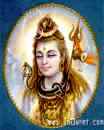|
Paraphrase (PR): "Bhavá (bhaváh), Sharvá (sharváh), Rudrá (rudráh), Pashupati (pashupatih); and likewise (átho) Úgra (úgrah) along with (sahá) Mahaadeva (mahaan); as well as (táthaa) Bhiimá (bhiimá) and Iishaaná (iishaanau)" --"iti" denotes inverted commas--. This (idám) (is) the group consisting of eight (ástakam) names (abhidhaana) of that (Shivá). Oh God (devá)!, even though (ápi) the Shrúti --the Veda-s-- (shrútih) examines accurately (pravicarati) each of them (pratyekam), I pay homage (pravihita-namasyah ásmi) to this (asmai) dear (priyaaya) (Transcendental) Abode or (Supreme) State --dhaama-- (dhaamne),(which is) You --bhavaan-- (bhavate) (essentially). (28)
CR:
Namo
nedisthaaya
priyadava davisthaaya
ca namo Paraphrase (PR): Oh You, who are fond (priyá) of fire (dava)!; salutation(s) (námah) to the Nearest One (nedisthaaya); and (ca) salutation(s) (námah) to the Remotest One (davisthaaya). Oh Destroyer (hara) of Kaamadeva --the god of love-- (smara)!; salutation(s) (námah) to the Smallest One (ksodisthaaya); and also (ca) salutation(s) (námah) to the Largest One (mahisthaaya). Oh three-eyed (Shivá) (trinayana)!; salutation(s) (námah) to the Oldest One (varsisthaaya);and also (ca) salutation(s) (námah) to the Youngest One (yavisthaaya). Salutation(s) (námah) to You (te) who are all --sárva-- (sarvasmai); and also (ca) salutation(s) (námah) to Sárva --an epithet for Shivá-- (sarvaaya) (since He appears in the form of) "that (tád) and this (idám-iti)" --the sense is that Shivá is called "Sárva" because He is this person and that person, this animal and that animal, this object and that object, etc... in short, He is everything and everyone. (29)
CR:
Bahalarajase vishvotpattau bhavaaya namo namah Paraphrase (PR): Salutation(s) over and over again (námah námah) to Bhavá --an epithet for Shivá meaning "Existence"-- (bhavaaya) (appearing in the form of) Vishvotpatti --lit. "he who gives rise to the universe", that is, Brahmaa, the Creator-- (vishvotpattau), (in whom there is) copious (bahala) Rajoguna --i.e. the quality known as "Rájas"-- (rajase). Salutation(s) over and over again (námah námah) to Hara --an epithet for Shivá meaning "Destroyer"-- (haraaya) (appearing in the form of) Tatsamhaara --lit. "he who destroys that (very universe)", that is, Rudrá, the Destroyer-- (tatsamhaare) (in whom there is) abundant (prabala) Tamoguna --i.e. the quality known as "Támas"-- (tamase). Salutation(s) over and over again (námah námah) to Mrida --an epithet for Shivá meaning "Compassionate" or "Merciful"-- (mridaaya) (appearing in the form of) Sattvodrikti --lit. "he who abounds in Sattvaguna or the quality known as Sattvá", that is, Visnu, the Preserver-- (sattvodriktau) for the sake (krite) of happiness (sukhá) of (all) living beings (jána). Salutation(s) over and over again (námah námah) to Shivá --lit. "Auspicious"-- (shivaaya) (appearing in the form of) the resplendent (pramahasi) state (pade) which is devoid of the three Guná-s or qualities (nistraigunye). (30)
CR:
Page 12 of 16 |

